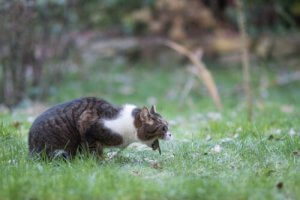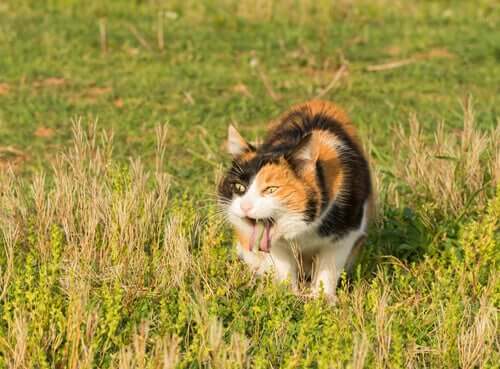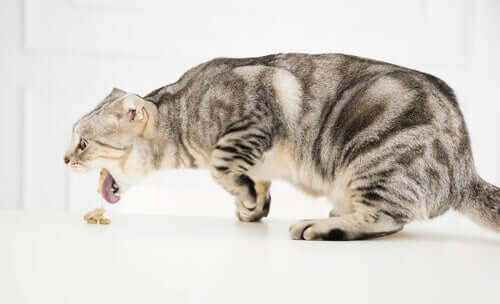Acute Vomiting in Cats - Causes and Solutions


Written and verified by the biotechnologist Alejandro Rodríguez
Acute vomiting in cats is a symptom you should definitely monitor if it happens often. Keep in mind that vomiting is one of those anomalous types of behavior or symptoms that doesn’t necessarily pose a serious risk to a cat’s health. In any case, today we’re going to give you more information about its possible causes and solutions.
Why do cats vomit?
As we said above, vomiting in cats is relatively normal. It’s part of processes such as expelling hairballs, for example. However, if the vomiting becomes recurrent or it occurs after they eat then you might have to consult a veterinarian.
Your doctor should be able to give you a detailed diagnosis together with the possible causes. In addition, if you can provide them with detailed information about the context in which the vomiting in your cat is happening, then they won’t have to guess and will be better qualified to prescribe the most appropriate treatment. There are several possible reasons why your cat might be vomiting, and today we’ll tell you about the most common ones.
Unhealthy diet
In case you don’t already know, a balanced and healthy diet is synonymous with health. This applies to every animal. So, a diet based on products that aren’t cat-appropriate will most likely lead to an upset stomach and they’ll end up vomiting.

Poor eating may also be due to allergies or food intolerance. If you’re not aware of these and continue to feed them the same things then their body will be caught in the cycle of not being able to process it and therefore rejecting it every time they eat.
Eating too much, too fast
If your pet has a propensity to overeating then acute vomiting is likely to happen sooner rather than later. The process of ingestion and digestion in cats is quite different from the human process. Therefore, eating too much too fast will cause the digestive system to overload, and this will prevent proper digestion.
Conditions related to acute vomiting
There are some unusual everyday situations that could be masking a digestive disorder in your cat. Acute vomiting is an example of this, as it’s one of the symptoms of other diseases such as acute gastritis.
There are many reasons for this disorder. For example, poor digestion or the intake of a toxic substance. As you can see, acute vomiting is one of the most common symptoms of gastritis.

Other underlying causes of vomiting may be:
- Intestinal parasites that can alter the normal functioning of a cat’s body
- Hyperthyroidism
- Pancreatitis
- Kidney diseases
Solutions to acute vomiting in cats
The most important thing here is to identify the origin of the acute vomiting, if possible. If the cause is food, then you must design a proper diet that provides the nutrients their body needs as, well as those that are easy to digest.
You might want to divide the cat’s meals into smaller portions and space them out if they tend to eat too fast. Also, you could place the bowl of food time in front of them for a certain amount of time, removing and returning it as you deem necessary. This is mainly to keep them from gulping it down all at once.
Acute vomiting could be the result of more serious diseases. So, you must immediately consult your veterinarian when it happens. If possible, bring along a vomit sample to help the professional identify a possible cause. This will certainly speed up the diagnosis and the appropriate treatment to follow.
We hope you’ve enjoyed this article.
Acute vomiting in cats is a symptom you should definitely monitor if it happens often. Keep in mind that vomiting is one of those anomalous types of behavior or symptoms that doesn’t necessarily pose a serious risk to a cat’s health. In any case, today we’re going to give you more information about its possible causes and solutions.
Why do cats vomit?
As we said above, vomiting in cats is relatively normal. It’s part of processes such as expelling hairballs, for example. However, if the vomiting becomes recurrent or it occurs after they eat then you might have to consult a veterinarian.
Your doctor should be able to give you a detailed diagnosis together with the possible causes. In addition, if you can provide them with detailed information about the context in which the vomiting in your cat is happening, then they won’t have to guess and will be better qualified to prescribe the most appropriate treatment. There are several possible reasons why your cat might be vomiting, and today we’ll tell you about the most common ones.
Unhealthy diet
In case you don’t already know, a balanced and healthy diet is synonymous with health. This applies to every animal. So, a diet based on products that aren’t cat-appropriate will most likely lead to an upset stomach and they’ll end up vomiting.

Poor eating may also be due to allergies or food intolerance. If you’re not aware of these and continue to feed them the same things then their body will be caught in the cycle of not being able to process it and therefore rejecting it every time they eat.
Eating too much, too fast
If your pet has a propensity to overeating then acute vomiting is likely to happen sooner rather than later. The process of ingestion and digestion in cats is quite different from the human process. Therefore, eating too much too fast will cause the digestive system to overload, and this will prevent proper digestion.
Conditions related to acute vomiting
There are some unusual everyday situations that could be masking a digestive disorder in your cat. Acute vomiting is an example of this, as it’s one of the symptoms of other diseases such as acute gastritis.
There are many reasons for this disorder. For example, poor digestion or the intake of a toxic substance. As you can see, acute vomiting is one of the most common symptoms of gastritis.

Other underlying causes of vomiting may be:
- Intestinal parasites that can alter the normal functioning of a cat’s body
- Hyperthyroidism
- Pancreatitis
- Kidney diseases
Solutions to acute vomiting in cats
The most important thing here is to identify the origin of the acute vomiting, if possible. If the cause is food, then you must design a proper diet that provides the nutrients their body needs as, well as those that are easy to digest.
You might want to divide the cat’s meals into smaller portions and space them out if they tend to eat too fast. Also, you could place the bowl of food time in front of them for a certain amount of time, removing and returning it as you deem necessary. This is mainly to keep them from gulping it down all at once.
Acute vomiting could be the result of more serious diseases. So, you must immediately consult your veterinarian when it happens. If possible, bring along a vomit sample to help the professional identify a possible cause. This will certainly speed up the diagnosis and the appropriate treatment to follow.
We hope you’ve enjoyed this article.
All cited sources were thoroughly reviewed by our team to ensure their quality, reliability, currency, and validity. The bibliography of this article was considered reliable and of academic or scientific accuracy.
- Hernández, C. A. (2010). Emergencias gastrointestinales en perros y gatos. Revista CES Medicina Veterinaria y Zootecnia, 5(2), 69-85
- Zeinsteger, P. A., & Gurni, A. A. (2004). Plantas tóxicas que afectan el aparato digestivo de caninos y felinos. Revista Veterinaria, 15(1), 35-44.
This text is provided for informational purposes only and does not replace consultation with a professional. If in doubt, consult your specialist.








